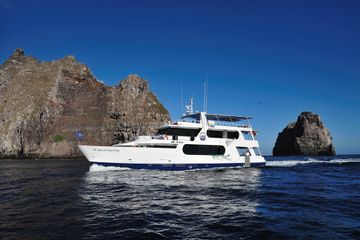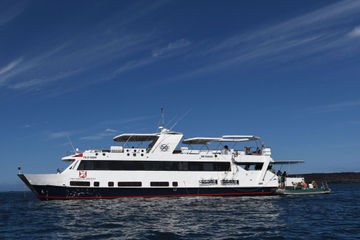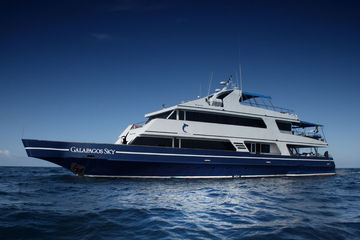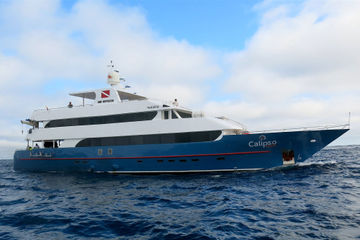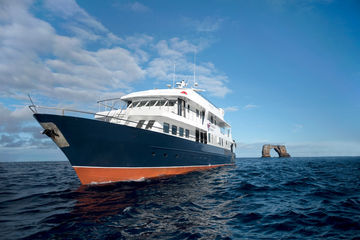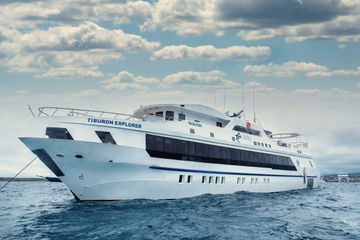Scuba diving at Darwin Island
Scuba diving at Darwin Island
Darwin Island Scuba Diving is the pinnacle of many people's diving life. After a mammoth sail to the very north of the Galapagos archipelago, dive boats stop for plenty of time to allow multiple dives per day, during which divers have the pleasure of immersing themselves in some of the richest waters known to man. Scuba diving at Darwin Island is widely recognised as a world class scuba diving destination, and contains an unparalleled variety of diverse and healthy marine life, just asking to be explored by eager underwater addicts visiting the Galapagos. It's a place that continues to amaze the most experienced of scuba divers, and even boat crews who visit the sites every day are consistently wowed and surprised by the astonishing environment beneath the surface.
9 Liveaboards in Darwin IslandExplore all liveaboards
Marine Life at Darwin Island
The huge array of tropical colours on show from the multitudes of reef fish in each site, are a fascinating spectacle when diving at Darwin Island. All the usual suspects are resident here in refreshingly healthy and high numbers, including Trumpetfish, Surgeonfish, Trevally, Parrotfish and Racoon Butterflyfish. Dolphins and Sea Lions are always sociable animals, but when diving in the waters around Darwin island this enthusiasm for human interaction seems to be exaggerated, with divers commonly coming in very close proximity to these playful creatures. The Galapagos are famed for sharks, and Darwin Island is no exception. Virtually every dive trip will result in sitings of sharks in great numbers and all different types - particularly Hammerheads, Galapagos Sharks and Silkys. In the correct season Whale Sharks are often seen as well.
Best Dive Sites in Darwin Island
Most dives at Darwin Island start from the same spot, although once below the surface, and depending on the conditions, guides can take a number of different routes. El Arco is home to many species of shark, including those classic of Galapagos waters (Hammerheads, Silkys, Galapagos). Divemasters commonly suggest simply picking a position to hover or rest, whilst watching the array of marine life glide on by, which can also include Manta Rays and Whale Sharks. El Arenal, or Darwin's Pillars (previously Darwin's Arch before it collapsed in 2021), received its original name from the distinct stone arch that rose boldly from the surface, now sadly just 2 pillars are left. Blacktips, Whale Sharks, Hammerheads and schools of Jacks are all found in abundance, continuing the once in a lifetime experience that scuba diving at Darwin Island creates.
Best Time To Dive At Darwin Island
Darwin Island diving is possible all year round, with much of the marine life ever present. Two seasons exist in the Galapagos - a wet and dry season. The wet season is between January and June, offering the warmest water temperatures from 20 to 25 degrees Celsius, occasionally reaching 28. The dry season is the busiest period for scuba diving at Darwin Island, which runs from July till December. It's a good idea to bring plenty of exposure protection as several dive sites will feel a little chilly, with temperatures ranging from 19 to 23 degrees. The reason this time of year is more popular is because of the increased chance of encountering Whale Sharks, together with higher numbers of Manta Rays and Hammerheads. Having said that, it's extremely likely for visitors to view particularly Mantas and Hammerheads throughout the year.
Experience Level For Diving Darwin Island
In the most part, diving at Darwin Island is best for advanced divers with experience of a variety of different conditions. Currents can be strong and surface water rough and choppy in many sites, which when combined with awkward rocks can prove challenging for the inexperienced. Often, operators of dive trips to Darwin Island will ask for a minimum of 50 logged dives and an advanced open water qualification. Having said that, some areas are calmer and gentler, therefore more suitable for newbies. It's advisable to check the likely itinerary before booking or setting off, and seek advice from the guides and operator. The aim of any dive safari is enjoyment, but of course safety is paramount.
How Do I Get To Darwin Island?
Darwin Island is a fair distance from the main group of Galapagos Islands, and often the best way to dive there is onboard a Galapagos liveaboard dive tour, which will allow divers to undertake multiple dives per day, in order to make the most of their time. Dive boats normally depart from the islands of San Cristobal or Baltra, where operators will often pick guests up from their small airports, where domestic flights regularly land from the larger international airports of Guayaqil and Quito. Several international airlines fly into Ecuador, making it easily accessible for most nationalities.
